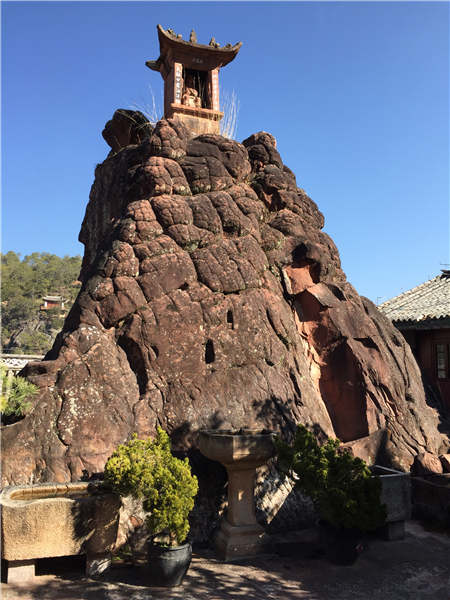A slice of ancient folk culture
By Yang Feiyue ( China Daily ) Updated: 2016-01-30 07:23:32
 |
|
A stone Buddhism tower on Shibao Mountain. Photos by Yang Feiyue / China Daily |
It is only accessible after an hour's drive up a tortuous mountain road, but is the best preserved market town along the Tea-Horse Road, which has connected Yunnan with the Tibet autonomous region since the late sixth century.
Everything turned into a blur in the dim yellow light from the thinly-scattered street lamps after night drew a veil over the Shaxi township.
I had to carry my suitcase all the way to the hotel to keep it from coming apart if I dragged it over the rough stone-paved lanes.
Shop-owners sat behind the counters of their small wooden stores with their backs practically touching the walls. The shelves held beverages, cigarettes and a few daily necessities.
It was like walking into the 1980s or a period before that.
The township sits approximately 2.2 kilometers above sea level in Jianchuan county, in southwestern China's Yunnan province.
Currently, only accessible after an hour's drive spiraling up a tortuous mountain road that would test you physically, the township is allegedly the best preserved market town along the Tea-Horse Road, which has connected Yunnan with the Tibet autonomous region since the late sixth century.
It used to serve as a rest and supply point for those who trekked all the way from Yunnan to Tibet for trade, mostly from Pu'er, a major tea production area in the province.
More than 90 percent of the 22,000 local residents are ethnic Bai people.
Most of them still live off the land where agriculture remains a primary source of livelihood.
|
|
|
|
|
|
|
|

























 Raymond Zhou:
Raymond Zhou: Pauline D Loh:
Pauline D Loh: Hot Pot
Hot Pot Eco China
Eco China China Dream
China Dream China Face
China Face






